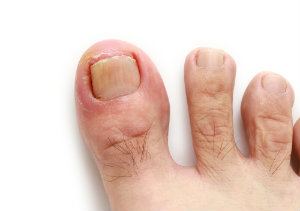Ingrown Toenails
It’s debatable how necessary toenails are in our modern life. They may have offered protection for our ancestors, but now we protect our feet with footwear. Even though they aren’t particularly useful, the fact remains – we have toenails and sometimes they cause problems, like ingrown toenails.
When you have a nail that becomes ingrown, it is important to address it early. Doing so will spare you a lot of discomfort or pain, and reduce your risk of developing an infection. Depending on your case, you might be able to resolve the problem at home on your own. If you are unable to do so, however, Dr. Borys Markewych can provide the treatment you need.

Why Ingrown Toenails Happen and How to Recognize Them
There are several common causes for nails that become ingrown, including:
- Inherited structure – This is perhaps the most common cause for ingrown toenails. For some people, an unusually-curved structure results in this problem. In these cases, the nail is more likely to continually become ingrown, even after it has been treated.
- Physical trauma – A traumatic accident (like dropping something heavy onto your foot) can potentially cause an ingrown toenail to develop.
- Improper nail trimming – Some cases of ingrown toenails are caused by faulty nail trimming practices.
- Ill-fitting footwear – Shoes that fit poorly create or contribute to a host of lower limb issues, including this one. Excessively tight footwear can crowd the toes together and increase the risk of a nail becoming ingrown.
An ingrown toenail condition is marked by the side or corner of a nail growing into the soft flesh that surrounds it. This can lead to such symptoms as pain, swelling, redness, and even a potential infection.
Whereas this condition can technically happen to any of the toes, it is most likely to occur in the big toe. In the event that you notice pus or redness that spreads, or if you are having severe pain in the area, it is important to make an appointment with South Hill Foot & Ankle Clinic for the professional treatment you need.
Ingrown Toenail Treatment – Home and Professional Care
Before we discuss at-home treatment for ingrown toenails, we need to state that this is not something you should attempt if you have diabetes. Ingrown toenails—as with anything out of the ordinary in your lower limbs—can lead to serious medical conditions. Instead of putting yourself at unnecessary risk by attempting to handle the situation on your own, call our office and schedule the earliest possible appointment so Dr. Markewych can provide professional care in a medically-sterile environment.
If you are not diabetic, the best place to start with treating ingrown toenails is with home care, particularly if the condition is mild or caught early. You may be able to find the relief you are seeking by using the following steps:
- Soak your feet for 15-20 minutes in warm water with two teaspoons Epsom salt to soften the nail tissue. This can also relieve tenderness and reduce swelling.
- After the soaking, place a fresh bit of waxed dental floss under the edge that has become ingrown. Doing so encourages the nail to grow over the skin, and not into it.
- Apply antibiotic cream or ointment to the tender area and then properly bandage the affected toe (to reduce the risk of infection).
In the event home treatment does not work, it is time to seek professional treatment from Dr. Markewych. Depending on what your situation requires, he may need to simply lift the nail for you. In more severe cases, or those that are recurrent, it may be necessary to remove either part or the entire toenail.
When an entire nail is removed, measures are taken to make it a permanent condition. This entails making it so the nail matrix does not generate additional tissue. For some patients, the nail will continue to become ingrown, cause you pain and discomfort, and increase your risk for potential infections if the entire nail is not removed.
Ingrown Toenail Prevention Tips
Prevention is always a better option than having to treat a condition, especially when the steps are easy and straightforward. For ingrown nails, this means:
- Protecting your feet from physical trauma. If your job requires frequently moving heavy items, invest in a pair of safety shoes or steel-tipped work boots.
- Wearing footwear that fits correctly. When buying shoes for yourself (or loved ones), make sure they aren’t too tight in the front and have enough room so your toes can wiggle freely.
- Trimming toenails properly. Our office recommends rounding them and not clipping the nails too short.
Professional Ingrown Toenail Care in Spokane
If you need professional care for ingrown toenails, give Dr. Markewych and South Hill Foot & Ankle Center a call at (509) 747-0274. One of our team members will be glad to assist. If you’d prefer, you can also connect with our Spokane, WA office by using our online form found here on our website.
Contact Us
© Generic Foot & Ankle. All Rights Reserved. | Privacy Policy
Web Design and Marketed by VMD Services.
